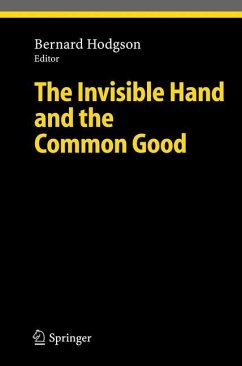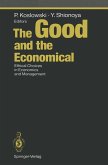The basic moral significance of neo-classical economics and the competitive market system it represents is founded on the classical liberal tradition in which the "simple system of natural liberty" is claimed to give expression to the harmony of each with all. Though such a common good would not be the outcome of the intentions of individual agents or state planning, nevertheless, the impersonal forces of a capitalist market would so allocate resources as to lead the self-interested participants in such an economy, as if by an "invisible hand", to a coherent social order of mutual advantage. The papers in this volume critically examine central aspects of the preceding social ethos underlying contemporary political economy and our increasingly globalized market culture. The inquiry is undertaken from a variety of disciplinary perspectives at the intersection of philosophy, economics, political science, sociology, psychology, and computer science.
This volume consists of papers derived from the Ninth International Conference on Studies in Economic Ethics and Philosophy (SEEP), held at Trent University in Peterborough, Ontario, Canada, in June of 2002. Let me take this opportunity to express my appreciation to Professor Peter Koslowski for his original stimulus, encouragement, and continual assistance in making the Conference a success. I would also like to thank my Trent colleague, Professor David Holdsworth, for his steadfast help in the management of the Conference and the papers resulting from it. I am obliged to Mr. Louis Taylor of North George Studios in Peterborough for his expert professional service in preparing the manuscript for printing. Finally, let me gratefully acknowledge the generous financial sponsorship of the Conference by the Social Sciences and Humanities Research Council of Canada, and Trent University's Department of Philosophy and Graduate Centre for the Study of Theory, Culture, and Politics. Bernard Hodgson Department of Philosophy Trent University Peterborough, Ontario, Canada May 2004 Contents Preface . . . . . . . . . . . . . . . . . . . . . . . . . . . . . . . . . . . . . . . . . . . . . . . . . . . . . . . . . . . . . . . . . . . . . . . . . . . . . . . . . . . . . . . . . . . . . . . . . . . . . . . . . . . . . . . . IX Introduction BERNARD HODGSON . . . . . . . . . . . . . . . . . . . . . . . . . . . . . . . . . . . . . . . . . . . . . . . . . . . . . . . . . . . . . . . . . . . . . . . . . . . . . . . . . . . . . . . . . . . . . 1 Part One Setting the Problem Chapter 1 Public Interest and Self-Interest in the Market and the Democratic Process PETER KOSLOWSKI . . . . . . . . . . . . . . . . . . . . . . . . . . . . . . . . . . . . . . . . . . . . . . . . . . . . . . . . . . . . . .. . . . . . . . . . . . . . . . . . . . . . . . . . . . . . . 13 Chapter2 The Invisible Hand and Thinness of the Common Good RICHARD DE GEORGE . . . . . . . . . . . . . . . . . . . . . . . . . . . . . . . . . . . . . . . . . . . . . . . . . . . . . . . . . . . . . . . . . . . . . . . . . . . . . . . . . . . . . . . . . 38 CONTENTS Part Two Constraining the Invisible Hand Chapter 3 Hiring Invisible Hands for Public Works EDWARDJ. NELL . . . . . . . . . . . . . . . . . . . . . . . . . . . . . . . . . . . . . . . . . . . . . . . . . . . . . . . . . . . . . . . . . . . . . . . . . . . . . . . . . . . . . . . . . . . . . . . . . 51 Chapter4 A Market Failures Approach to Business Ethics JOSEPH HEATH . . . . . . . . . . . . . . . . . . . . . . . . . . . . . . . . . . . . . . . . . . . . . . . . . . . . . . . . . . . . . . . . . . . . . . . . . . . . . . . . . . . . . . . . . . . . . . . . . . . . . 69 Chapter 5 Abstractions and Conceptual Automata in Economics and Non-Economics STEPHEN REGOCZEI . . . . . . . . . . . . . . . . . . . . . . . . . . . . . . . . . . . . . . . . . . . . . . . . . . . . . . . . . . . . . . . . . . . . . . . . . . . . . . . . . . . . . . . . . . .. .
This volume consists of papers derived from the Ninth International Conference on Studies in Economic Ethics and Philosophy (SEEP), held at Trent University in Peterborough, Ontario, Canada, in June of 2002. Let me take this opportunity to express my appreciation to Professor Peter Koslowski for his original stimulus, encouragement, and continual assistance in making the Conference a success. I would also like to thank my Trent colleague, Professor David Holdsworth, for his steadfast help in the management of the Conference and the papers resulting from it. I am obliged to Mr. Louis Taylor of North George Studios in Peterborough for his expert professional service in preparing the manuscript for printing. Finally, let me gratefully acknowledge the generous financial sponsorship of the Conference by the Social Sciences and Humanities Research Council of Canada, and Trent University's Department of Philosophy and Graduate Centre for the Study of Theory, Culture, and Politics. Bernard Hodgson Department of Philosophy Trent University Peterborough, Ontario, Canada May 2004 Contents Preface . . . . . . . . . . . . . . . . . . . . . . . . . . . . . . . . . . . . . . . . . . . . . . . . . . . . . . . . . . . . . . . . . . . . . . . . . . . . . . . . . . . . . . . . . . . . . . . . . . . . . . . . . . . . . . . . IX Introduction BERNARD HODGSON . . . . . . . . . . . . . . . . . . . . . . . . . . . . . . . . . . . . . . . . . . . . . . . . . . . . . . . . . . . . . . . . . . . . . . . . . . . . . . . . . . . . . . . . . . . . . 1 Part One Setting the Problem Chapter 1 Public Interest and Self-Interest in the Market and the Democratic Process PETER KOSLOWSKI . . . . . . . . . . . . . . . . . . . . . . . . . . . . . . . . . . . . . . . . . . . . . . . . . . . . . . . . . . . . . .. . . . . . . . . . . . . . . . . . . . . . . . . . . . . . . 13 Chapter2 The Invisible Hand and Thinness of the Common Good RICHARD DE GEORGE . . . . . . . . . . . . . . . . . . . . . . . . . . . . . . . . . . . . . . . . . . . . . . . . . . . . . . . . . . . . . . . . . . . . . . . . . . . . . . . . . . . . . . . . . 38 CONTENTS Part Two Constraining the Invisible Hand Chapter 3 Hiring Invisible Hands for Public Works EDWARDJ. NELL . . . . . . . . . . . . . . . . . . . . . . . . . . . . . . . . . . . . . . . . . . . . . . . . . . . . . . . . . . . . . . . . . . . . . . . . . . . . . . . . . . . . . . . . . . . . . . . . . 51 Chapter4 A Market Failures Approach to Business Ethics JOSEPH HEATH . . . . . . . . . . . . . . . . . . . . . . . . . . . . . . . . . . . . . . . . . . . . . . . . . . . . . . . . . . . . . . . . . . . . . . . . . . . . . . . . . . . . . . . . . . . . . . . . . . . . . 69 Chapter 5 Abstractions and Conceptual Automata in Economics and Non-Economics STEPHEN REGOCZEI . . . . . . . . . . . . . . . . . . . . . . . . . . . . . . . . . . . . . . . . . . . . . . . . . . . . . . . . . . . . . . . . . . . . . . . . . . . . . . . . . . . . . . . . . . .. .








